Dogs have an innate desire and need to chew. Chewing helps relieve pain, keep teeth clean, and provide mental stimulation. However, it’s important to choose safe chews for your dog. In this article, I will explore the safety of yak chews for dogs and provide you with all the information you need to make an informed decision for your pet’s chew habits.
Key Takeaways:
- Yak chews can provide a natural and long-lasting chewing experience for dogs.
- Choosing the right size and texture of yak chew is crucial for your dog’s safety.
- Yak chews are made from natural ingredients and are easily digestible.
- Monitor your dog while they chew to prevent choking or swallowing large pieces.
- Consult with your veterinarian for personalized recommendations on safe dog chews.
Why Dogs Chew and Common Chewing Habits
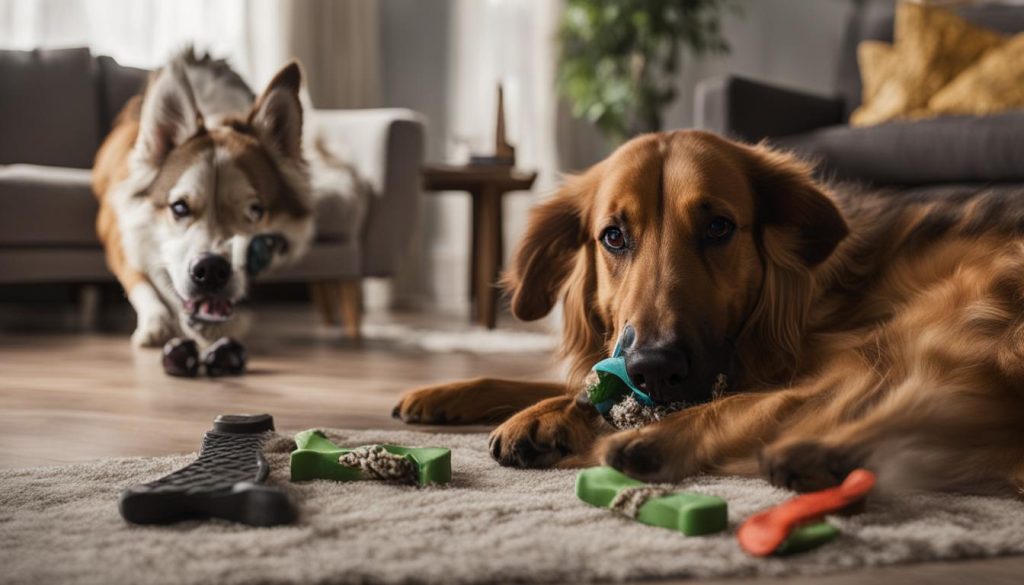
Dogs have a natural instinct to chew, and this behavior serves several purposes. Understanding why dogs chew and their common chewing habits can help you provide appropriate chew toys and promote their dental health.
One of the primary reasons dogs chew is to alleviate teething pain. Just like human babies, puppies go through a teething phase where their baby teeth are replaced with adult teeth. Chewing helps soothe their gums and relieve discomfort during this time.
Additionally, dogs chew to keep their teeth clean and strong. Chewing helps remove plaque and tartar buildup, preventing dental issues such as gum disease and tooth decay. Dogs of all ages engage in this behavior to maintain good oral hygiene.
Furthermore, dogs chew to relieve anxiety or boredom. Chewing provides mental stimulation and helps calm dogs in stressful situations. It can be a way for them to occupy themselves and feel more relaxed.
| Chewing Habits | Explanation |
|---|---|
| Teething | Puppies chew to alleviate teething pain |
| Teeth cleaning | Dogs chew to keep their teeth clean and strong |
| Anxiety/Boredom | Chewing provides mental stimulation and relieves stress |
Potential Dangers of Unsafe Chews
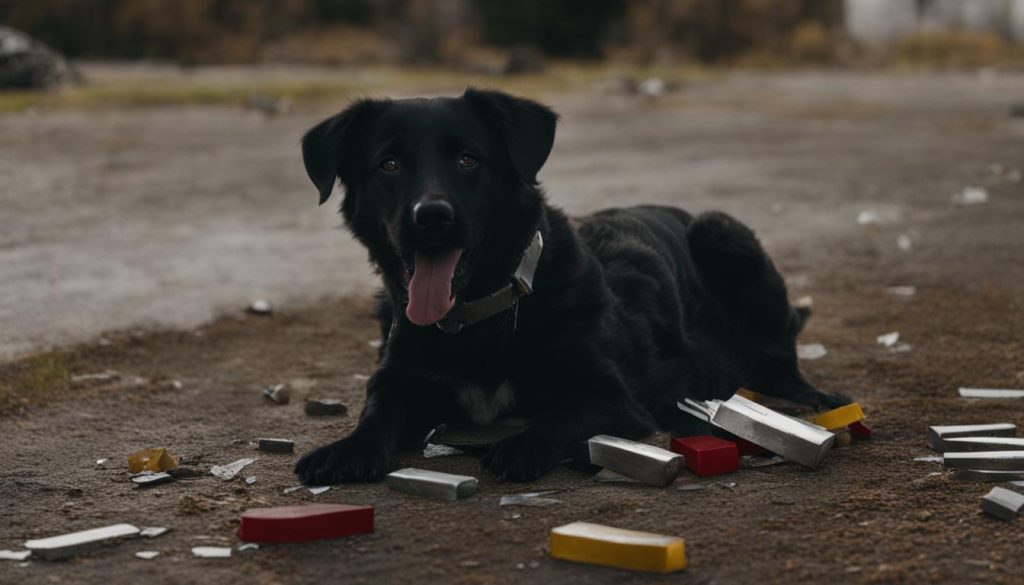
When it comes to choosing chew toys for your dog, safety should always be a top priority. Some chews and chew toys can pose risks to dogs, which can lead to serious health issues if not addressed. It’s important to understand the potential dangers associated with unsafe chews to ensure the well-being of your furry friend.
Risks of Tooth Injuries
One of the primary risks of unsafe chews is tooth injuries. Chews that are too hard or have sharp edges can cause fractures or cracks in your dog’s teeth. This can lead to pain, discomfort, and even infections. It’s crucial to choose chews that are appropriate for your dog’s size and dental health to prevent potential tooth injuries.
Obstruction Risk in the Gastrointestinal Tract
Another danger of unsafe chews is the risk of obstruction in the gastrointestinal tract. Chews that are too small or easily breakable can be swallowed by your dog, causing blockages in their digestive system. This can lead to severe abdominal pain, vomiting, and even require surgical intervention. It’s essential to choose chews that are large enough to prevent swallowing and easily digestible.
Choking Hazards
Unsafe chews can also pose choking hazards for dogs. Chews that are too small or have parts that can easily break off can become lodged in your dog’s throat, preventing them from breathing properly. This can be a life-threatening emergency that requires immediate veterinary attention. It’s crucial to carefully select chews that are sized appropriately for your dog and do not have small, detachable parts.
| Unsafe Chew Risks | Safety Measures |
|---|---|
| Tooth injuries from hard or sharp chews | Choose chews appropriate for your dog’s size and dental health |
| Obstruction risk in the gastrointestinal tract | Select chews that are large enough to prevent swallowing and easily digestible |
| Choking hazards from small or breakable chews | Ensure chews are sized appropriately and do not have small, detachable parts |
By being aware of the potential dangers of unsafe chews and taking appropriate safety measures, you can help protect your dog from unnecessary risks. Always consult with your veterinarian for recommendations on safe chew toys that are suitable for your dog’s specific needs and characteristics.
Bones as Chews for Dogs
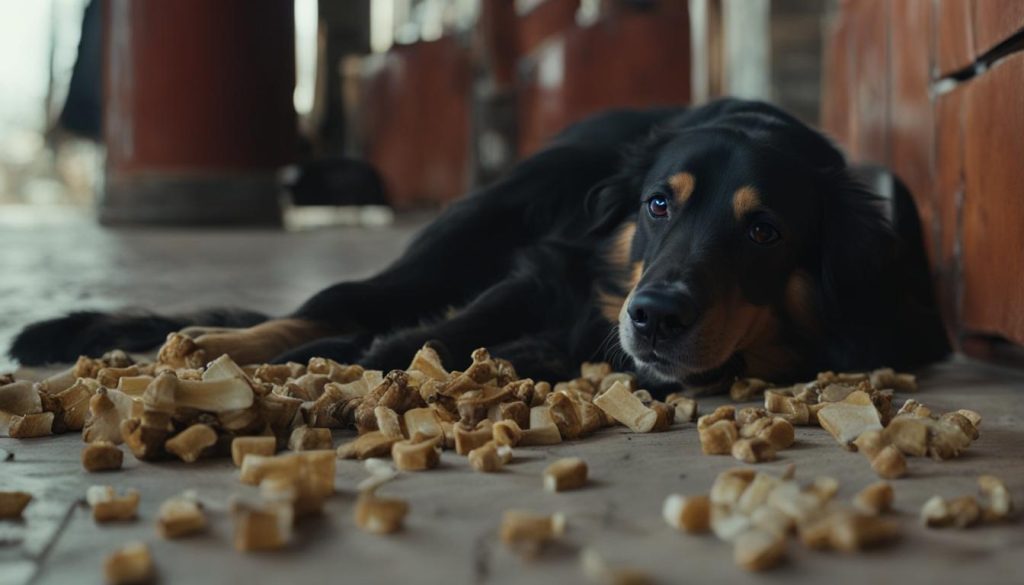
When it comes to choosing chew toys for dogs, bones are often a popular option. However, it’s important to be aware of the potential dangers and risks associated with feeding bones to dogs. Whether cooked or uncooked, bones can pose serious health hazards for your furry friend.
First and foremost, bones can splinter, leading to tooth injuries or even puncture the gastrointestinal tract. Dogs chewing on bones may break their teeth, causing pain and potential infection. Additionally, bones can cause constipation or digestive blockages if they are swallowed in large pieces.
The Food and Drug Administration (FDA) warns pet owners about the dangers of feeding bones to dogs. It’s best to avoid giving bones to your dog as chew toys. Instead, opt for safer alternatives that provide a similar chewing experience without the associated risks.
Risks of Feeding Bones to Dogs:
| Risks | Consequences |
|---|---|
| Tooth injuries | Pain, infection, and potential tooth loss |
| Obstruction risk | Constipation or digestive blockages |
| Choking hazards | Difficulty breathing or swallowing |
By avoiding bones as chews for your dog, you can help protect their dental health and overall well-being. Consult with your veterinarian for safer chew options that are suitable for your dog’s size, chewing habits, and dental condition.
Hard Cheese Chews, Yak Chews, and Blocks
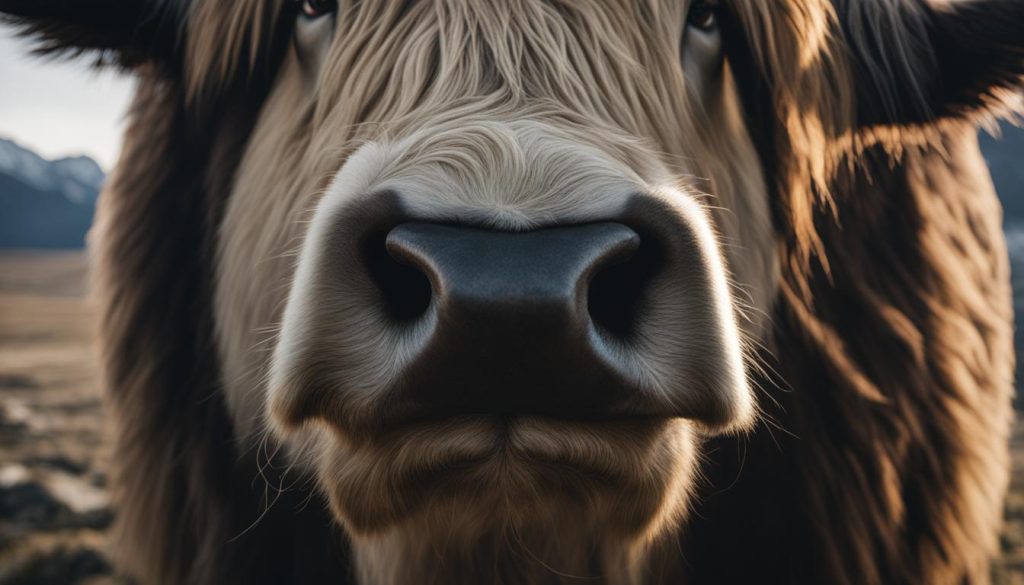
When it comes to providing your dog with a satisfying and long-lasting chewing experience, hard cheese chews, including yak chews, have gained popularity. However, it’s important to consider the safety aspects before introducing these chews to your furry friend.
While hard cheese chews offer durability, they may also pose risks to your dog’s dental health. Some brands of yak chews are extremely hard and can potentially lead to broken teeth. To ensure the safety of your dog, it’s recommended to opt for softer alternatives or offer small amounts of real cheese as a treat instead.
It’s crucial to remember that every dog is unique, and what works for one may not work for another. By carefully considering your dog’s size, chewing habits, and dental health, you can make an informed decision when choosing the suitable chew toy for your furry companion.
Summary
- Hard cheese chews, including yak chews, can be too hard and may lead to broken teeth.
- Consider softer alternatives or small amounts of real cheese for your dog.
- Choose the right size and texture based on your dog’s needs and monitor them while chewing.
Table: Comparison of Hard Cheese Chews and Soft Cheese Alternatives
| Chew Type | Texture | Hardness | Dental Health |
|---|---|---|---|
| Yak Chews | Hard | High | Risk of broken teeth |
| Soft Cheese Alternatives | Soft | Low | Gentler on teeth |
Nylabones or Nylon Chews
When it comes to choosing safe chew options for your dog, Nylabones or nylon chews are worth considering. These chew toys are specifically designed to satisfy a dog’s natural urge to chew while minimizing the risk of tooth injuries. Nylabones are made from durable nylon material, making them long-lasting and less likely to splinter compared to other chew toys.
One of the key benefits of Nylabones is their variety in size and texture. They are available in different sizes to suit dogs of various breeds and ages. It’s essential to choose the appropriate size for your dog to ensure a safe chewing experience. Additionally, Nylabones come in different textures, ranging from softer ones for puppies and senior dogs to tougher textures for aggressive chewers.
When introducing your dog to a Nylabone or nylon chew, it’s important to monitor their chewing behavior. Regularly inspect the chew toy for any signs of wear or damage, and replace it if necessary. Always follow the manufacturer’s guidelines for proper use and care. Remember, no chew toy is completely indestructible, so it’s crucial to supervise your dog while they enjoy their Nylabone to prevent any accidents or choking hazards.
Benefits of Nylabones or Nylon Chews:
- Durable and long-lasting
- Minimize the risk of tooth injuries
- Available in different sizes and textures
- Provide a safe chewing experience
- Satisfy a dog’s natural urge to chew
Overall, Nylabones and nylon chews can be a safer alternative to harder chew toys like bones or hard cheese chews. They offer durability, variety, and a reduced risk of dental injuries. However, it’s crucial to choose the appropriate size and texture for your dog, supervise their chewing, and regularly inspect the chew toy for any signs of wear. With proper care and caution, Nylabones can provide your dog with a satisfying and safe chewing experience.
Benefits of Yak Chews for Dogs
Dogs love to chew, and providing them with the right chew toy is essential for their dental health and overall well-being. One popular option for dog owners is yak chews. These natural and long-lasting chews offer several benefits for dogs.
Firstly, yak chews are high in protein and low in fat, making them a healthy choice for dogs. They are made from yak milk, which is rich in nutrients that contribute to your dog’s nutritional needs. Additionally, yak chews are free from additives or preservatives, ensuring that your dog is not consuming any harmful substances.
Another benefit of yak chews is their dental health benefits. Chewing on these hard and durable chews helps remove plaque and tartar from your dog’s teeth, promoting good oral hygiene. By reducing plaque and tartar build-up, yak chews can help prevent dental issues such as tooth decay and gum disease.
| Benefits of Yak Chews for Dogs |
|---|
| High in protein, low in fat |
| Free from additives or preservatives |
| Promote good oral hygiene |
Additionally, yak chews provide dogs with a long-lasting chewing experience. They are tough and durable, making them ideal for heavy chewers. This helps satisfy your dog’s natural instinct to chew and can provide mental stimulation. The long-lasting nature of yak chews also means that they can keep your dog entertained for extended periods.
When considering the benefits of yak chews for your dog, it’s important to choose the right size and texture. Each dog is different, and you should select a yak chew that suits your dog’s chewing habits and dental health. By providing your dog with a yak chew, you can contribute to their overall dental health and provide them with a safe and enjoyable chewing experience.
Choosing the Right Yak Chew for Your Dog
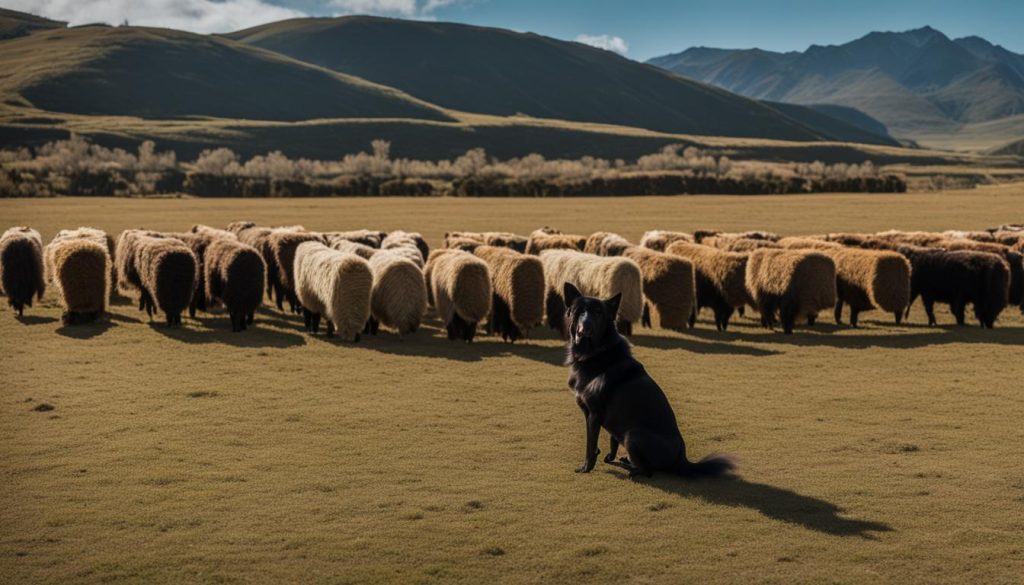
When it comes to selecting a yak chew for your dog, it’s important to consider several factors to ensure their safety and satisfaction. Here are some key factors to consider when choosing yak chews for dogs:
- Size: Choose a yak chew that is appropriate for your dog’s size. Avoid chews that are too small, as they may pose a choking hazard, and opt for larger chews for bigger dogs to prevent swallowing whole pieces.
- Hardness: Take into account the hardness of the yak chew. Some dogs may have sensitive teeth or gums and may require a softer chew. It’s essential to find a yak chew that strikes a balance between being durable and safe for your dog’s dental health.
- Ingredients: Look for high-quality, all-natural yak chews that are free from additives or preservatives. These chews provide a healthier option for your dog and minimize the risk of adverse reactions.
By considering these factors, you can ensure that you choose a yak chew that meets your dog’s chewing needs and promotes their overall well-being.
Comparison of Yak Chew Brands
| Brand | Size Options | Hardness | Ingredients |
|---|---|---|---|
| Brand A | Small, Medium, Large | Medium | 100% natural yak milk |
| Brand B | Small, Large | Hard | Yak milk, cow milk, salt |
| Brand C | Medium, Large | Soft to Medium | Yak and cow milk, lime juice, salt |
This table compares three popular yak chew brands based on size options, hardness, and ingredients. Brand A offers a range of sizes suitable for all dogs and has a medium hardness, making it a versatile option. Brand B, on the other hand, is harder and may be more suitable for dogs with strong jaws. Brand C provides a softer to medium chew, ideal for dogs with sensitive teeth or gums. All three brands use natural ingredients, but the specific composition may vary slightly.
Remember, every dog is unique, so it’s essential to consider your dog’s individual needs and preferences when choosing a yak chew. Consulting with your veterinarian can also provide valuable guidance in selecting the right chew for your furry friend.
Safety of Yak Chews for Dogs

When it comes to choosing safe chew options for dogs, yak chews are generally considered a safe choice. These chews are made from natural ingredients, such as yak milk and cheese, making them easily digestible for our furry friends. However, it’s important to keep a few things in mind to ensure the safety of your dog while enjoying these treats.
Firstly, it is crucial to select the right size of yak chew for your dog. Choosing a chew that is too large or too small can pose potential hazards. A chew that is too large may cause choking, while a chew that is too small can be a choking hazard or may be swallowed whole. Take into consideration your dog’s size, breed, and chewing habits when selecting the appropriate size.
Additionally, closely monitor your dog while they are chewing on a yak chew. This allows you to intervene if your dog begins to show signs of distress or difficulty with the chew. It’s also important to be mindful of any small pieces that may break off from the chew, as these can also pose a choking hazard. Remove any small or sharp pieces that could potentially harm your pet.
In summary, yak chews can be a safe and enjoyable chew option for dogs, provided that the appropriate precautions are taken. Choose the right size chew for your dog and closely supervise them while they enjoy their chew. By doing so, you can ensure that your dog’s chewing experience is safe and enjoyable.
Wrapping Up
To summarize, yak chews can be a safe and enjoyable option for dogs to satisfy their natural chewing instincts. However, it’s crucial to choose the right yak chew for your dog based on their individual needs, chewing habits, and dental health. By considering factors such as size, hardness, and ingredients, you can ensure a safe and satisfying chewing experience for your furry friend.
While yak chews are generally considered safe, it’s important to monitor your dog while they chew and provide appropriate supervision to prevent choking or swallowing of large pieces. Remember, every dog is unique, so what works for one dog may not work for another. If you have any concerns or questions regarding yak chews or other chew options for your dog, it’s always best to consult with your veterinarian for personalized recommendations.
Overall, by making informed choices and prioritizing your dog’s safety and well-being, you can provide them with a rewarding chewing experience that promotes good oral hygiene and mental stimulation. So, go ahead and explore the world of yak chews for your furry companion, keeping in mind their specific needs and preferences.
Recommendation for Safe Dog Chews
When it comes to choosing safe dog chews, there are a few options that I recommend considering. One of these options is Nylabones or nylon chews. These chew toys are specifically designed to be durable and long-lasting, while also being safe for your dog’s teeth.
Nylabones are made from strong nylon material that can withstand even the most aggressive chewers. They come in a variety of sizes, shapes, and textures, allowing you to find the perfect match for your furry friend. Just make sure to choose the appropriate size and texture for your dog’s chewing habits and dental health.
It’s also a good idea to consult with your veterinarian for personalized recommendations based on your dog’s specific needs. Your vet can provide guidance on the safest chew toys for your dog, taking into account factors such as size, breed, and any dental issues they may have.
Remember, the safety and well-being of your dog should always be your top priority when selecting chew toys. By choosing safe and appropriate options, you can provide your dog with a satisfying chewing experience while minimizing the risk of dental injuries or other hazards.
FAQ
Are yak chews safe for dogs?
Yak chews can be safe for dogs when chosen appropriately. It’s important to consider factors such as size, hardness, and ingredients when selecting a yak chew for your dog. Monitor your dog while they chew to prevent choking or swallowing large pieces.
Why do dogs chew and what are common chewing habits?
Dogs chew for various reasons, including teething, teeth cleaning, relief from anxiety or boredom, and enjoyment. Puppies chew to alleviate teething pain, while older dogs chew to keep their jaws strong and teeth clean. Understanding your dog’s chewing habits can help provide them with safe and appropriate chew toys.
What are the potential dangers of unsafe chews?
Some chews and chew toys can pose risks to dogs, including tooth injuries, obstruction risk in the gastrointestinal tract, and choking hazards. It’s crucial to choose safe chews and be aware of these risks to ensure your dog’s safety and well-being.
Can dogs safely chew on bones?
Bones, whether cooked or uncooked, can splinter and cause tooth injuries, constipation, choking hazards, or digestive blockages. It is recommended to avoid giving bones to dogs as chew toys.
Are hard cheese chews and yak chews safe for dogs?
Hard cheese chews, including yak chews, can be too hard and may lead to broken teeth. It’s recommended to choose softer alternatives or small amounts of real cheese for your dog.
What are Nylabones or nylon chews and are they safe for dogs?
Nylabones or nylon chews can be a safer alternative to hard chews like bones or hard cheese chews. They are designed to satisfy a dog’s natural urge to chew while being durable and less likely to cause tooth injuries. It’s important to choose the appropriate size and texture for your dog.
What are the benefits of yak chews for dogs?
Yak chews provide dogs with a long-lasting and natural chewing experience. They are high in protein, low in fat, and free from additives or preservatives. Yak chews can also help clean your dog’s teeth and promote good oral hygiene by reducing plaque and tartar build-up.
How do I choose the right yak chew for my dog?
When selecting a yak chew for your dog, consider factors such as size, hardness, and ingredients. Choose a size appropriate for your dog and opt for a softer chew if your dog has sensitive teeth or gums. Look for high-quality, all-natural ingredients and avoid chews with additives or preservatives.
Are yak chews safe for dogs?
Yak chews are generally considered safe for dogs when given in moderation and under appropriate supervision. They are made from natural ingredients and are easily digestible. However, it’s important to choose the right size and texture for your dog and monitor them while chewing to prevent choking or swallowing large pieces.
What are the recommended safe dog chews?
Safe dog chews include alternatives like Nylabones or nylon chews, which are designed to be durable yet safe for your dog’s teeth. Consult with your veterinarian for personalized recommendations based on your dog’s specific needs and chewing habits.






